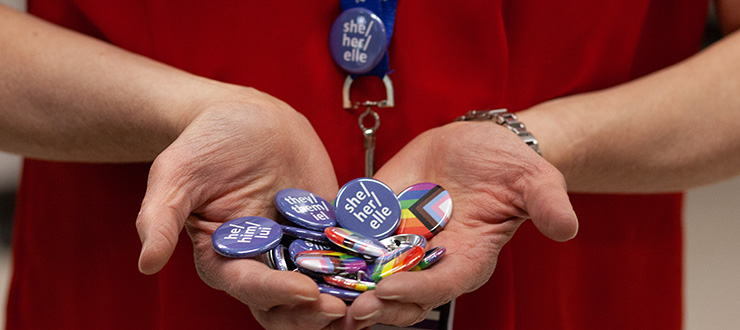
The Ottawa Hospital’s admitting and emergency registration staff wear these buttons featuring their pronouns
Your pronouns are an important part of your identity, much like your name. Assuming someone’s pronouns based on appearance can not only be wrong, but it can also be hurtful and even harmful. Transgender staff and volunteers at The Ottawa Hospital answer frequently asked questions about personal pronouns and explain how to use them respectfully.
What are pronouns?
Answered by Darla Burrow (she/her), eLearning Administrator
A pronoun is another word that substitutes for a noun and is often used to convey gender.
However, because a person’s actual gender may differ from the one they were assigned at birth, they may use different pronouns than expected (i.e. a trans woman using feminine pronouns like she/her). Someone’s pronouns can also change over time as they explore and better understand their gender. Some people have genders which do not fit into the male/female binary and often use they/them pronouns. Some experience gender in a fluid way which slides between binary positions, changing pronouns or using multiple sets of pronouns at once (he/they or he/him/they/them). Others experience gender beyond standard English vocabulary and may use neopronouns like xe/xir or fae/faer or have genders rooted in their specific culture’s historical roles whose pronouns don’t translate into English. There are people who do not use any pronouns and prefer that their name be used in contexts where third-person pronouns would be used.
Why is it important to respect and ask for personal pronouns?
Answered by Jesse Bossé (they/them), member of The Ottawa Hospital’s Rainbow Patient and Family Advisory Committee and registered psychologist with Tall Tree Psychology
When we ask about pronouns, it prevents us from misgendering people. We know that getting misgendered has a lot of negative impacts on mental health. It is associated with increased risks of depression, anxiety and suicidality. Many studies have consistently demonstrated a direct link between instances of misgendering or erasure and poor mental health. I would even suggest that asking for pronouns is a form of suicide prevention. It is about protecting gender diverse people’s lives and combatting cisnormativity (the assumption that everyone is cisgender). I get misgendered quite often, and it’s exhausting. I get home at the end of the day completely drained. That’s a burden I carry as a gender diverse person. But if people were to ask about pronouns and not make assumptions about my gender, I wouldn’t have to carry that exhaustion or fatigue. When we don’t ask about pronouns or don’t respect pronouns, it sends a message to gender diverse folks that they don’t matter or that there’s no room for them to exist.
How do I ask for someone’s pronouns?
Answered by Cole Etherington (he/him), Senior Research Associate
In general, I think the easiest way is to simply introduce yourself with your name and pronouns to each new person you meet, regardless of their gender identity or presentation. In other words, do this with everyone in your life: cisgender and trans/non-binary/gender non-conforming folks alike. Make it just a regular thing and not a thing used selectively. If I meet someone and say, “Hi. My name is Cole, and my pronouns are he/him. It’s great to meet you!” it opens up an opportunity for others to share their pronouns as well.
If you have introduced yourself with your pronouns first, and the person hasn’t disclosed theirs, gently ask if they are comfortable sharing their pronouns so that you can address them correctly. I think the majority of people would share them and be fine with the question. If someone doesn’t choose to share their pronouns, or you are unsure of which pronouns to use, it’s best to just avoid using gendered language in the conversation—something we should do anyway, especially when we don’t know someone personally.
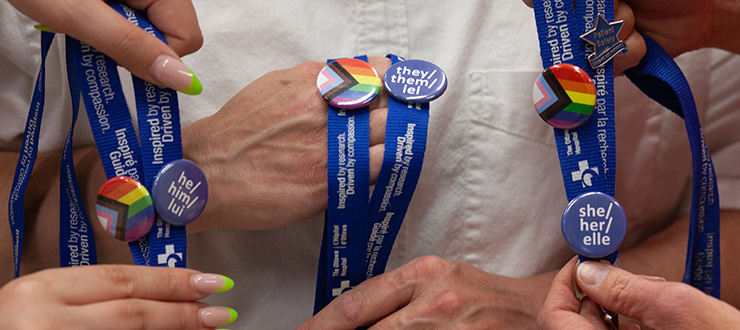
What if I use the wrong pronoun?
Answered by Darla
Say sorry and correct yourself. That is it. You don’t need to do anything more than that. But be sure to watch yourself in the future. There is a difference between the occasional slip-up and making a habit of it.
What are some ways that The Ottawa Hospital respects patient pronouns?
Answered by Ben Murray (he/him), member of The Ottawa Hospital’s Rainbow Patient and Family Advisory Committee
In admitting and emergency registration, patients are asked their pronouns when they come in to access care. A training module around gender diversity was launched for admitting and emergency registration staff, which the Rainbow Patient and Family Advisory Committee helped develop. A lot of the staff who took that training got buttons with the pronouns they use, and they have been trained to introduce themselves with their name and pronouns and ask each patient how they want to be addressed. Other training sessions around gender diversity have been held at the hospital as well. Epic [a technology used by the hospital to securely store, organize and access patient records] has been revised so that people’s pronouns and chosen names are on record so they can be referred to by something other than their birth name. There is a push for the hospital to be more equitable and diverse.
Additional resources
- Pflag Canada is Canada’s only national organization that offers peer-to-peer support striving to help all Canadians with issues of sexual orientation, gender identity and gender expression.
- Rainbow Health Ontario’s Trans Health Knowledge Base features answers to questions commonly asked by trans and non-binary folks in Ontario.
- Trans Student Educational Resources is a youth-led organization dedicated to transforming the educational environment for trans and gender non-conforming students through advocacy and empowerment.
- The Get REAL Movement is a Canadian non-profit focused on combatting 2SLGBTQ+ discrimination, racism and bullying in schools, summer camps and workplaces.
- The Gender Dysphoria Bible is a guide for those who are questioning, those who are starting their transgender journey, those already on their path and those who simply wish to be better allies.

Support patient care and research at
The Ottawa Hospital
You might also like…
“It’s about giving them hope and purpose”: Ottawa Inner City Health’s Block Leaders program marks one year serving the community
Seven days a week, Block Leaders head out into the ByWard Market to help fellow members of their community who are unhoused or use drugs. They provide support to people in distress, respond to overdoses and even clean their neighbourhood — all with the goal of creating a safer and healthier community for everyone.
We’ve got you covered: The Ottawa Hospital now offers bandages for a variety of skin tones
Whenever you’ve scraped your knee or had your blood drawn, odds are your bandage was the same colour every time. Peach has been the default hue for over a century — but no longer at The Ottawa Hospital.
The Ottawa Hospital and YouTube Health partner to increase access to health information in Canada
Looking for health information online can lead you down a rabbit hole of misinformation. That’s why we’ve launched a series of videos with YouTube Health. Presented in both English and French by experts from across The Ottawa Hospital, these videos cover everything you need to know about an array of common medical conditions.
Looking to get screened for cancer but don’t have a family doctor? Make an appointment with our “Superscreener”
Regular cancer screening can help save lives. For people living in Eastern Ontario who do not have a primary care provider, the Champlain Screening Outreach Program offers screening services for breast, cervical, colorectal and lung cancer. Find out how to book your appointment with Nurse Practitioner Sarah Junkin-Hepworth, our “Superscreener.”
The power of community @ TOH
Last year, Registered Nurse Macrina Valcin created an intricate display on her unit for Black History Month, transforming the unit’s bulletin board into a powerful celebration of Black people, culture and history. This year, thanks to the warm support and encouragement from a newly formed inclusive community, Macrina is showcasing her passion project to a much larger audience.
New gender-affirming surgery clinic now accepting patients
The Ottawa Hospital’s new gender-affirming surgery clinic is truly one of a kind. Launched in September 2023, it’s the only clinic in Ontario to offer trans and non-binary patients facial, top and bottom procedures. Plastic Surgeon Dr. Nicholas Cormier and his team are happy to announce that they are now accepting patient referrals from physicians.


 To reset, hold the Ctrl key, then press 0.
To reset, hold the Ctrl key, then press 0.
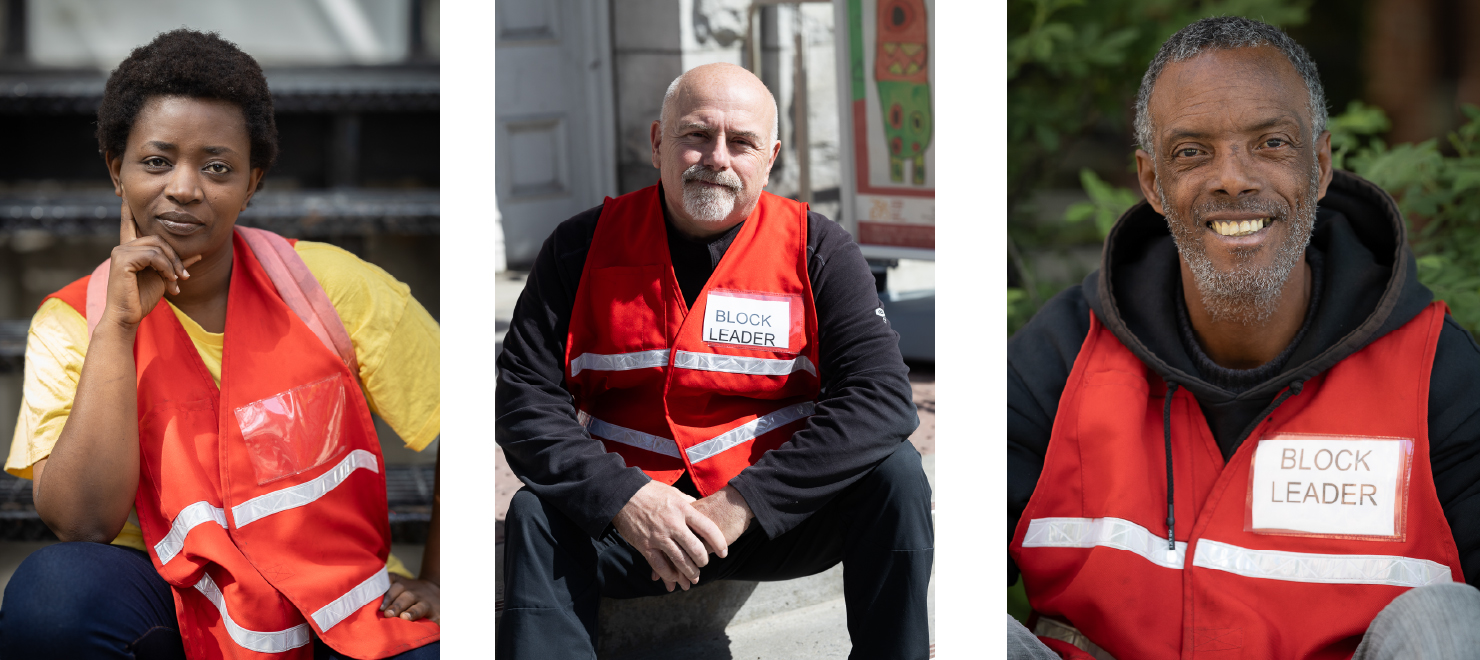
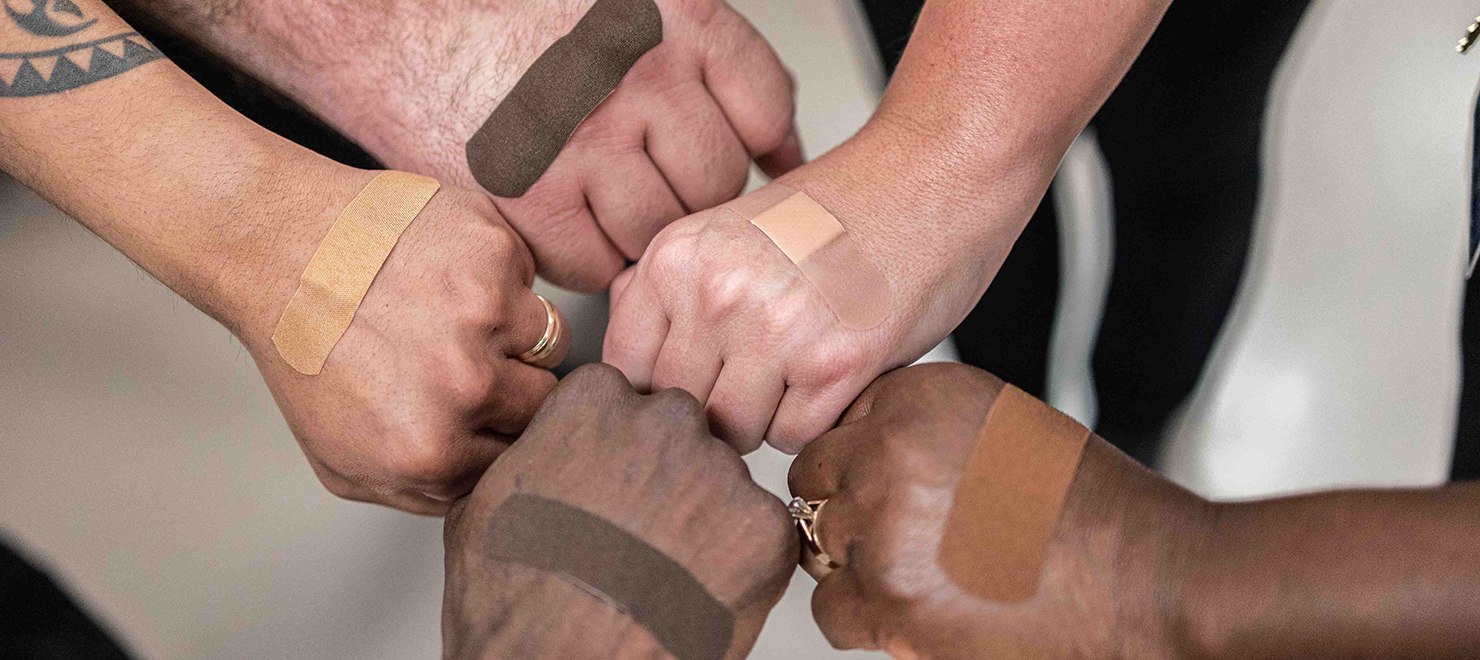
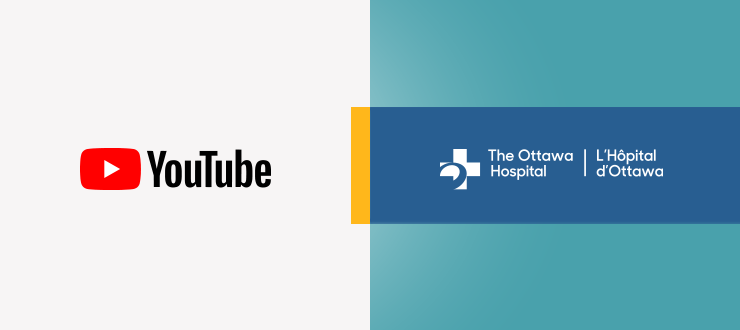

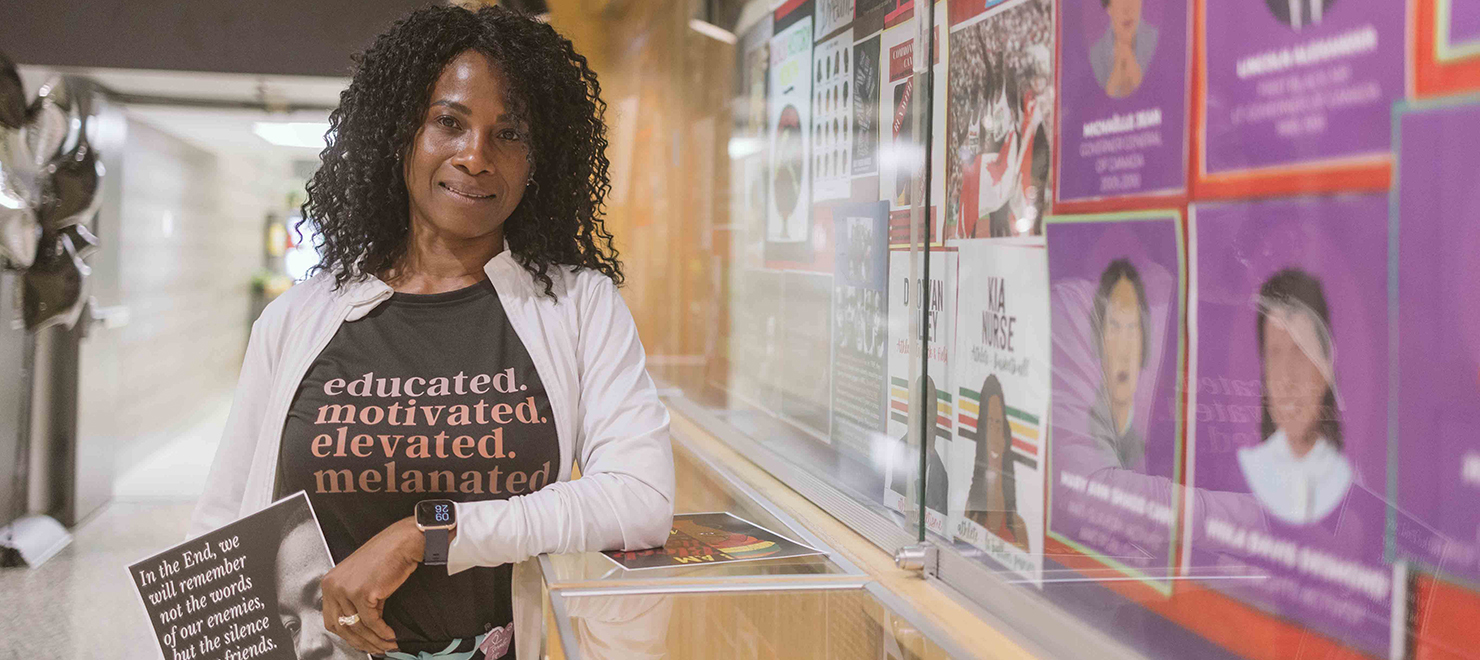

Comment on this post